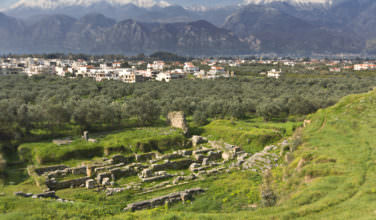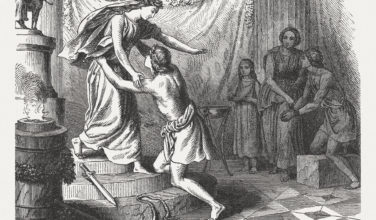The Real Story of Pheidippides
Comments Off on The Real Story of Pheidippides
 Pheidippides, also referred to as Pheidippides, was the messenger soldier who famously ran a long distance from the battlefield at Marathon to Athens in order to tell the people that the Athenians had, in fact won. After he gave his message, he promptly dropped dead from the exertion. The distance between Marathon and Athens is about 26 miles, and today’s marathon races have been created to commemorate that.
Pheidippides, also referred to as Pheidippides, was the messenger soldier who famously ran a long distance from the battlefield at Marathon to Athens in order to tell the people that the Athenians had, in fact won. After he gave his message, he promptly dropped dead from the exertion. The distance between Marathon and Athens is about 26 miles, and today’s marathon races have been created to commemorate that.
As noble as this idea is, the folklore surrounding this ill-fated but important run aren’t complete. In fact, it is more likely that he ran a much greater distance than 26 miles. Here’s an overview of who Pheidippides was and the real details of the historic events surrounding his noble actions and also of his death.
Day Runner By Profession
Pheidippides was employed as a day runner, referred to as hemerodrome, in Ancient Greek, by the Athenian military. These ancient couriers were responsible for running for days at a time in order to give important messages. They were designed to move swiftly and to arrive with their messages in a timely manner. They trained extensively, and they were capable of running great distances.
Pheidippides Runs to Sparta
Pheidippides was on duty the day of the fabled Battle of Marathon, which pitted the Athenian army against the Persian army. However, before the invasion, it was Pheidippides responsibility to run the 240 kilometer (150 mile) distance from Athens to Sparta to ask Sparta for their help. Sparta said they’d help but since they were in the middle of a religious festival, they were unable to leave right away. The journey from Athens to Sparta took about two days. After he gave his message to the Spartans requesting their help, he turned around and ran the distance from Sparta to Athens to let them know that the Spartans wouldn’t be able to fight right away.
Athens Fights Against Persia Alone
Ultimately, by the time Sparta would have been ready, the outcome of the Battle of Marathon was already complete. Although the Persian army far outnumbered the Athenian army, Athens proved to have a better battle strategy and more sophisticated fighting techniques. Athens won the battle, but now it was up to Pheidippides to make the run from Marathon to Athens, a distance of 40 kilometers or about 25 miles. He gave the message explaining that Athens was victorious and then he collapsed and died from the combined exertion of that run and the 300 miles that he ran from Athens to Sparta and back.
Here is an excerpt from a poem that Robert Browning wrote to commemorate that fated moment:
Unforeseeing one! Yes, he fought on the Marathon day:
So, when Persia was dust, all cried “To Akropolis!
Run, Pheidippides, one race more! the meed is thy due!
‘Athens is saved, thank Pan,’ go shout!” He flung down his shield,
Ran like fire once more: and the space ‘twixt the Fennel-field
And Athens was stubble again, a field which a fire runs through,
Till in he broke: “Rejoice, we conquer!” Like wine thro’ clay,
Joy in his blood bursting his heart, he died–the bliss!
Pheidippides story is immortalized in paintings, poetry, and every time someone runs a marathon. However, the marathon runs only tell part of the story. But to really understand what he went through, it is much more accurate to run the Spartathalon, which is actually a distance of 246 kilometers and closely resembles the route Pheidippides actually ran.
Source:
Wikipedia – The Battle of Marathon Poem
Categorized in: Ancient Greek History
This post was written by Greek Boston
Share this Greek History Article:





